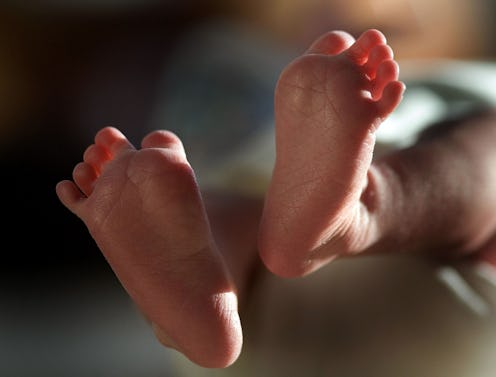News
Wait, What Is "Three-Parent IVF," Anyway?
Don't look now, but our friends across the pond are about to take a huge step forward in reproductive science. After much debate, the House of Commons has overwhelmingly voted to approve a new in-vitro fertilization technique that could save countless families and offspring from debilitating genetic disease, and it's now just a vote from the House of Lords away from being official. Basically, so-called "three-parent" IVF was approved by the British parliament Tuesday, and it's a decision that could have big societal implications.
Here's the basic idea: there are a range of genetic conditions that are the result of defective mitochondrial DNA (mDNA), which exclusively pass down from mothers to their offspring. "Three-parent" IVF would thwart those genetic defects by introducing a third person into the reproductive mix — a woman who can donate her healthy mDNA, replacing the handing-down of the biological mother's flawed mitochondria. In simplest terms, it's a dramatic new avenue science has created to allow people to start families who might never have been able to otherwise.
It's raised controversy from familiar corners, however. Mainly, people wary of genetic manipulation and alteration, who may fear the direction this kind of science could take society. But clearly, the overwhelming majority of MPs (382 voted in favor, with just 128 opposed) agreed that slippery-slope fears shouldn't get in the way of curing potentially devastating genetic conditions, and that's got to be incredible news for many would-be parents across the UK.
So, what precisely does this entail for British society? It's hard to know for certain, since the approval isn't even entirely official yet — while it's widely believed that the House of Lords will approve the measure, they still have to make it official. One of the most important things to recognize is what "three-parent" in this context actually means. While it's the popular moniker that the media has latched onto to refer to this story, it's a really imprecise way of describing what's actually happening. As reproductive ethicist Dr. Gillian Lockwood told the BBC, there should be better ways to refer to it.
The biggest problem is that this has been described as three-parent IVF. In fact it is 2.001-parent IVF. Less than a tenth of one per cent of the genome is actually going to be affected. It is not part of what makes us genetically who we are. It doesn't affect height, eye color, intelligence, musicality.
As such, it seems highly doubtful you'd ever see, say, some sort of competing custody claim or interference relating to rights of parentage — the woman who provides her healthy mitochondria is isn't having an impact on anything we typically think of as visible, genetically inherited traits. Rather, it's just about the healthiness of the body's cells. This is a crucial fact that cuts against some of the fears that opponents of the procedure have raised — the possibility that this is just the first step towards a so-called "designer baby" culture. But the kinds of trait selections people seem to worry about most in that scenario aren't the sort affected by this new form of IVF.
This much, at least, is very clear: the number of debilitating conditions that could be helped by this new technology is immense. Many mitochondrial diseases — like Leigh's Disease, one of the most prominent and awful examples — consign children to tragically early deaths, and cause an incredible amount of heartbreak and financial strife for their families. On the promise alone that this could change, it's really great news to hear that Britain is taking this step.
Images: Getty Images (2)
